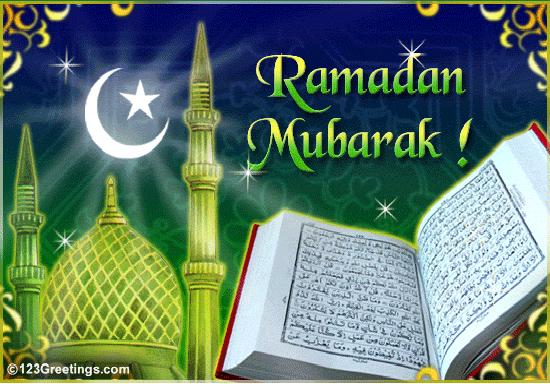Ramadan al-Mubarak is here once again. A month of blessing, designated by fasting, special prayers and charity. More than just being a holy month, Ramadan reflects its credibility for devotion to Allah.
Ramadan (calendar month)
From Wikipedia, the free encyclopedia
This article is about the Islamic calendar month called Ramadan. For
information about the holiday and religious observances by the same
name, see Ramadan (religious observances).
Islamic Calendar
1. Muharram
2. Safar
3. Rabi’ al-awwal
4. Rabi’ al-thani
5. Jumada al-awwal
6. Jumada al-thani
7. Rajab
8. Sha’aban
9. Ramadan
10. Shawwal
11. Dhu al-Qi’dah
12. Dhu al-Hijjah
Ramadan or Ramadhan (Arabic: رمضان) is the ninth month of the Islamic calendar.
The word Ramadan is derived from the word ramd “to burn”. Fasting in the month of Ramadan is one of the five pillars of Islam. The month is spent by Muslims fasting
during the daylight hours from dawn to dusk. The name came from the
time before the Islamic calendar, when the month of Ramadan fell in the
summer. Fasting during this month is often thought to figuratively burn
away all sins. Muslims believe that the Qur’an was sent down to the earth during this month. Furthermore, Muhammad
told his followers that the gates of Heaven would be open all the month
and the gates of Hell would be closed. The first day of the next month
is spent in celebrations and is observed as the ‘Festival of Breaking
Fast’ or `Eid ul-Fitr.
Contents
* 1 Timing
* 2 Events
* 3 References
* 4 External links
Timing
The Islamic calendar is a lunar calendar, and months begin when the first crescent of a new moon is sighted. Since the Islamic Lunar calendar year is 11 to 12 days shorter than the solar year and contains no intercalation,
Ramadan migrates throughout the seasons. The Islamic day starts after
sunset. The actual and estimated start and end dates for Ramadan in
2005-2010 were and are as follows:
CE AH Start End
2005 1426 2 October 1 November
2006 1427 23 September 22 October
2007 1428 13 September 12 October[1]
2008 1429 1 September 30 September
2009 1430[2] 24 August 23 September
2010 1431[3] 10 August 9 September
Ramadan dates between 2005 and 2010
Most Muslims insist on the local physical sighting of the moon to mark the beginning
of Ramadan, but some insist on using the calculated time of the new
moon or the Saudi Arabian declaration to determine the start of the
month. Since the new moon
is not in the same state at the same time globally, the beginning and
ending dates of Ramadan depend on what lunar sightings are received in
each respective location. As a result, Ramadan dates vary in different
countries, but usually only by a day or two.
Each year, Ramadan begins about eleven days earlier than in the previous year.[4] For astronomical projections of the approximate start of Ramadan, go to http://moonsighting.com/ and click on the “Ramadan” tab.
At the end of Ramadan, Eid ul-Fitr is celebrated by Muslims.
Events
* Ramadan is observed by Muslims during the entire lunar month by the same name. The month of religious observances consists of fasting and extra prayers.
o On 02 Ramadan, the Torah was bestowed on Moses. (As claimed by Shi’a Islam)
o On 10 Ramadan, Khadija, wife of Muhammad, died.
o On 12 Ramadan, the Bible was bestowed on Jesus. (As claimed by Shi’a Islam)
o On 15 Ramadan, Hassan ibn Ali, grandson of Muhammad, final Rashidun Caliph and second Shia Imam was born.
o On 17 Ramadan, the Battle of Badr was won by the Muslims.
o On 18 Ramadan, the Psalms were bestowed on David. (As claimed by Shi’a Islam)
o On 19 Ramadan, Ali ibn Abu Talib was injured by a sword.
o On 21 Ramadan, Ali ibn Abu Talib died due to injuries he sustained by a sword.
o On 27 Ramadan, the Qur’an was bestowed on Muhammad. (In accordance with Shi’a Islam; according to Sunni Islam the date is unknown, but is in the last ten days of Ramadan)
o Laylat al-Qadr
is observed during one of the last five odd numbered days of the month.
Muslims believe that this night is better than a thousand months. This
is often interpreted as praying throughout this night is rewarded
equally with praying for a thousand months. Many Muslims spend the
entire night in prayer.
According to Shi’a Islam this night is the 19th or 21st, or 23rd of this month, but according to the Sunni this night is 21, 23, 25, 27 or 29.However the true date was intentionally withheld.
* In Iran, Al-Quds Day is held on the last Friday of Ramadan (since the Iranian Revolution).
* In the Ottoman Empire, the sultan presented trays of baklava to the Janissaries in a ceremonial procession called the Baklava Alayı.
References
1. ^ Fiqh Council of North America
2. ^ Calendar Magic 16.8
3. ^ Calendar Magic 16.8
4. ^ Ramadan FAQ – Ramadan Awareness Campaign
External links
* Islamic-Western Calendar Converter (Based on the Arithmetical or Tabular Calendar)
* Determining the beginning of Ramadan
* Predicting the First Visibility of the Lunar Crescent
* Islamic ramadan calendar 2007, 2008, 2009
* The Umm al-Qura Calendar of Saudi Arabia
http://www.mudahonline.com/



No comments:
Post a Comment
Komen